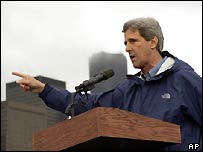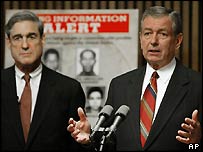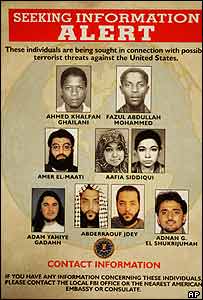
Kerry said homeland security was not what it should be
|
President Bush has come under fire for his handling of the domestic war on terror after a warning of a possible al-Qaeda attack in the US.
Attorney General John Ashcroft said information showed al-Qaeda intended "to hit the United States hard".
On Wednesday Mr Ashcroft named seven people he said were a clear danger.
But Democratic challenger Senator John Kerry questioned Mr Bush's commitment to providing the resources necessary to protect the country.
He said that while Americans would be struck by the administration's "seriousness and concern" over the issue, the threat had highlighted certain failures.
The authorities had in particular been unable to provide security on trains and chemical plants, and to inspect containers coming into US ports, he said.
"We deserve a president of the United States who doesn't
make homeland security a photo opportunity," he said at a rally in Seattle.
"We deserve a president who makes America safer."
'Convenient'
Other critics appeared to doubt the authenticity of the threat, which has not led to the level of the national security alert being raised. It remains at yellow, indicating an "elevated" level of risk two degrees away from the red "severe risk".

Ashcroft (r) urged heightened security and awareness
|
Harold Schaitberger, president of the firefighters' union, said that the administration had known about the threats for a month.
"I do find it awfully convenient and suspicious that it happens to be tied in
right behind the president's recent message to the nation as well as his
troubling, plummeting poll numbers," he said.
Meanwhile a Democratic member of the Senate intelligence committee, Dick Durbin, said he thought there was growing scepticism about warnings from the Bush administration.
"We'll never know if the administration has new and
justifiable information for this new warning," Mr Durbin said.
White House spokesman Scott McClellan denied they were overplaying the threat, pointing to a "stream of credible intelligence" over the last couple of months.
Public appeal
He listed future events that could be targets, and, together with FBI chief Robert Mueller, said there was intelligence about a plot, but added this did not indicate the date, time, nor method of a possible attack.
 |
 There is clearly a steady drumbeat of information that they are going to attack and hit us hard
There is clearly a steady drumbeat of information that they are going to attack and hit us hard

|
Mr Mueller said 4 July celebrations, the Democratic and Republican party conventions, and the presidential elections in November could be at risk.
"The same events which fill most of us with hope and pride are seen by terrorists as possible targets for attack," he said.
They released the names and photographs of the seven suspects, including one woman, and asked for the public's help in tracking them down.

The suspects have all been sought for months
|
Some were US citizens or people who had spent a long time in the country.
Two of the men, Ahmed Khalfan Ghailani and Fazul Abdullah Mohammed, have already been indicted by a US court for alleged involvement in the 1998 bombings of US embassies in east Africa, which left several hundred dead.
"All present a clear and present danger to America. All should be considered armed and dangerous," Mr Ashcroft said.
Mr Ashcroft also warned that al-Qaeda may be changing its tactics, as members might travel with their families "to lower their profile" or be able to portray themselves as Europeans.
He said that the Madrid railway bombings, which came just before the Spanish general election, were believed by al-Qaeda members to have advanced their cause.
Political fallout from those attacks is believed to have contributed to the defeat of the governing party.
Mr Ashcroft warned al-Qaeda might try the same tactics in advance of the US poll.

